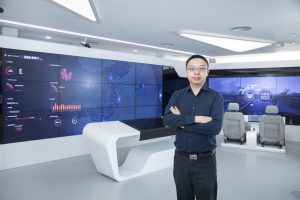Building a more intelligent world with AI
Building a more intelligent world with AI
Artificial intelligence has become ubiquitous in the modern world, powering technologies that we experience every day as well as others we’re less aware of, in industries from medical testing to manufacturing. Professor Lin Dahua is taking the development of AI and deep learning to the next level, leading the CUHK Multimedia Laboratory (MMLab) as it unleashes the potential of the technology through research and commercialisation. He also heads up a newly established research institute that allows CUHK to collaborate on the future development of computer vision and interdisciplinary AI research.

Computer vision technology has been extensively applied to every aspect of our daily lives, including autopilots, medical X-ray films analysis and body temperature detection.
Reading the runes where AI is concerned
When he was studying at university, Professor Lin was already certain about the massive potential of AI, and he later founded a tech company with Professor Tang Xiaoou, the teacher who introduced him to the field. He succeeded in commercialising the technology and realising his aspiration to use AI for smart living – and in doing so created a tech unicorn.
For Professor Lin, in addition to a lot of hard work, it also took a powerful enthusiasm for AI to achieve success. In 2004, when he was studying for his MPhil at CUHK, he was already immersing himself in learning about the development of AI in various parts of the world. “Professor Tang was my teacher back then. He always encouraged us to keep up with research literature. I read at least 1,000 papers that year and found that many world-class computer and information engineering scholars were working on the same topic – AI. It was when I started to show growing interest in computer vision,” recalled Professor Lin.
He studied for his PhD in computer engineering at Massachusetts Institute of Technology. At that time, research on computer vision was based around statistical learning, conceptual design and model construction. Not until 2014, when Professor Lin returned to CUHK to teach, was deep learning technology starting to pick up momentum. “AI experts all over the world participate in the annual ImageNet Large-Scale Visual Recognition Challenge,” he says. “They are required to write computer algorithms to detect and analyse the contents of one million images. The average error rate of the champion teams had been steady at 26% until 2012, when experts from the University of Toronto cut it to 16% by applying deep learning technology. The record shocked global academia. I came to realise that deep learning would take a revolutionary leap as it guided the development of AI in the future.”
After joining CUHK, Professor Lin led the MMLab to incorporate deep learning into the technology of machine learning and computer vision, the first research group to do so in Hong Kong. It is also the only Asian laboratory to be named among the “Pioneers in AI Research” at leading global AI gathering the GPU Technology Conference. Over the years, MMLab has made many breakthroughs in AI, including, in 2015, the world’s first facial recognition algorithm that overtook iris recognition in accuracy. In 2018 and 2019, the group was the champion in the international competition COCO Challenge in Object Detection, with its MMDetection toolbox enabling the detection of an object’s boundary and marking out its contour in an image.
“Computer vision has extensive applications. It is used in computer analysis or to learn to identify the features of images or visual data,” continued Professor Lin. “In the past, computer vision could analyse only five to ten seconds of video footage each time. The video analytics framework we developed in 2018 can handle 10 minutes, capturing people, objects and even story plots with visual modelling. It is an innovative way of understanding films.”
During his PhD studies in the U.S., Professor Lin had an eye-opening experience when he witnessed how multimedia laboratories there had applied AI to a variety of commercial products. He also realised that commercialisation of AI technology is the only way to realise its full potential. Armed with this belief, in 2014 Professor Lin joined Professor Tang and co-founded a tech company to apply computer vision extensively to autopilots, medical X-ray film analysis, body temperature detection, automatic garbage classification and robotic manufacturing.

The MMDetection toolbox developed by Professor Lin’s team makes use of deep learning to train AI systems to recognise objects with increased efficiency and accuracy.
Making computer vision ever more sophisticated
In the conventional world of computer vision, only one AI model can be applied to one particular context or environment. Different environments require different models, depending for example on whether they are indoors or outdoors, and the training for individual locations such as Immigration stations often takes months or longer. To tackle this issue, Professor Lin said, tech companies are working on a “super model” that can process numerous images applicable to different scenes. “This is our target too. We want to build a base model that can be applied to 100 or even 1,000 different scenes. This super model will embody huge computational power and self-monitoring ability. We hope it will make a revolutionary breakthrough for the industry similar to what deep learning has done.”
Professor Lin believes that interdisciplinary research will drive future development. CUHK and the Shanghai Artificial Intelligence Laboratory collaborated to set up the CUHK Artificial Intelligence and Interdisciplinary Research Institute in 2021. Appointed to direct the Institute, Professor Lin takes responsibility for guiding talented minds and promoting AI education and knowledge transfer, steering the development of AI and interdisciplinary research.
“We are promoting interdisciplinary research. We hope we can create synergy among different industries and help them to understand what their challenges and difficulties are by making good use of AI to work out practical solutions for them.”
— Professor LIN Dahua
Associate Professor, Department of Information Engineering, CUHK
Co-founder, SenseTime
Research areas: Computer Vision and Artificial Intelligence Technology
Major achievements:
- Published more than 100 research papers at top-tier international conferences and journals including CVPR, ICCV, ECCV, NIPS and T-PAMI
- NeurIPS Best paper awards (2010)
- Outstanding Reviewer Awards at ICCV (2009, 2011)
- Served as an area chair for multiple conferences, including AAAI (2020), CVPR (2019) and ECCV (2018)





